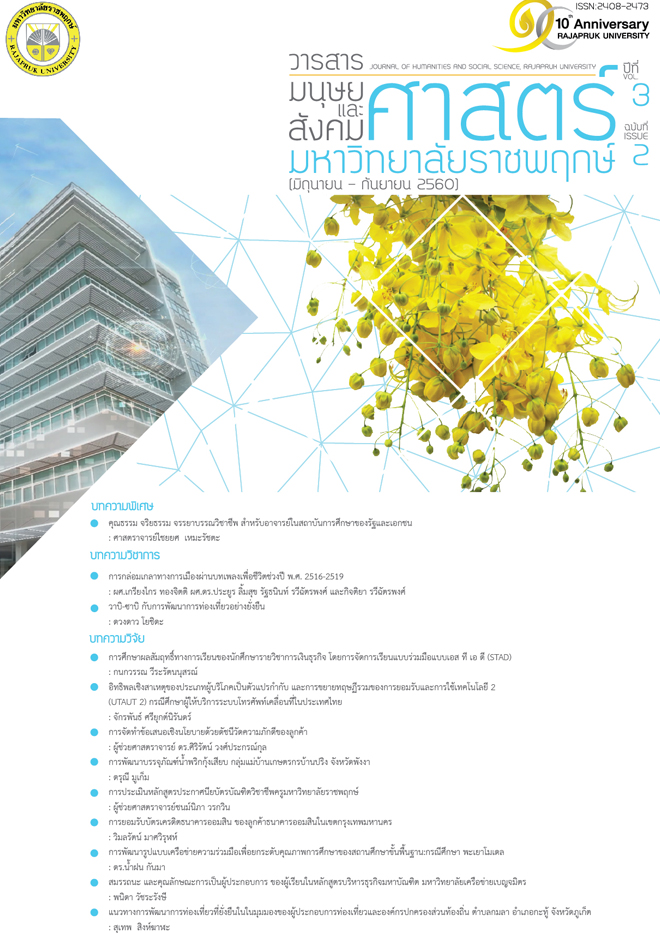Development of a Collaborative Network Model Enhancing Basic Education Quality: A Case of Phayao Model
Main Article Content
Abstract
This research aimed at developing a collaborative network model to enhance the quality of basic education: A Case Study of Phayao Model. The instrument used was an interview, a questionnaire and After Action Review form. The statistics used to analyze the data were mean (x̅) and Standard Deviation (SD).
The research found that: 1) The collaborative network model to enhance the quality of basic education: A Case Study of Phayao Model, there were 4 components of collaborative network model to enhance the quality of basic education: the first component was the principle of the collaborative network, the second was the objective of collaborative network, the third was the role of committee of a collaborative network, the fourth was the operational process of a collaborative network and the suitable model as well as enhancing the quality of basic education was rated at the high level of feasibility and at the highest level all of utility. Moreover, the participation assisted to enhance the quality of basic education: A Case Study of Phayao Model showed that 1) all of the participants involved working and followed the role as assigned. 2) all of partnership were mutually collaboration and mutually beneficial relationship with all stakeholders and generated all of the operation by using the PDCA was appropriate and useful at a very high level (x̅ = 4.11, x̅ = 4.16). 3) The teaching methodology of the target school was as a whole at a high level. 4) The satisfaction of the members of a collaborative network model to enhance quality of basic education: A Case Study of Phayao Model showed the satisfaction of the operational network and obtained the benefits of cooperation and gained knowledge to development their future project.
Article Details
References
ทำนอง ภูเกิดพิมพ์. (2551). แนวคิดการบริหารแบบมีส่วนร่วมในการจัดการศึกษาของชุมชน. ค้นเมื่อ 23 กันยายน 2557, จาก http://gotoknow/org/blog/mathu/334443
ปัทมา ทุมาวงศ์. (2551). การวิเคราะห์รูปแบบเครือข่ายความร่วมมือของครูใจโรงเรียนที่มีการปฏิบัติดี: การประยุกต์ใช้การวิเคราะห์เครือข่ายสังคม. วิทยานิพนธ์ครุศาสตรมหาบัณฑิต สาขาบริหารการศึกษา คณะครุศาสตร์ จุฬาลงกรณ์มหาวิทยาลัย.
พนมพร เผ่าเจริญ และคณะ. (2551). การพัฒนากระบวนการเครือข่ายการพัฒนาครูด้านการจัดสิ่งแวดล้อมในชั้นเรียนที่ช่วยให้นักเรียนเกิดการเรียนรู้โดยการสร้างองค์ความรู้ด้วยตนเองส้าหรับโรงเรียนขนาดเล็กในจังหวัดนครสวรรค์. คณะครุศาสตร์ มหาวิทยาลัยราชภัฏนครสวรรค์.
พรชัย ทองเจือ. (2550). การพัฒนารูปแบบความร่วมมือระหว่างสถาบันอุดมศึกษากับโรงเรียนในการเปลี่ยนผ่านด้านการเรียนการสอนในโรงเรียน. วิทยานิพนธ์ครุศาสตรดุษฎีบัณฑิต สาขาวิชาบริหารการศึกษา คณะครุศาสตร์ จุฬาลงกรณ์มหาวิทยาลัย.
วิจารณ์ พานิช. (2555). วิถีสร้างการเรียนรู้เพื่อศิษย์ในศตวรรษที่ 21. กรุงเทพฯ: มูลนิธิสดศรี-สฤษดิ์วงศ์.
สถาบันทดสอบทางการศึกษาแห่งชาติ. (2557). ผลการทดสอบทางการศึกษาระดับชาติขั้นสามัญ (Ordinary National Educational Test; O-NET). ค้นเมื่อ 23 เมษายน 2557, จาก https://education.kapook.com/view85196.html
สมศักดิ์ เอี่ยมดี. (2556). การพัฒนาระบบการบริหารเครือข่ายการมีส่วนร่วมในการจัดการศึกษาของสำนักงานเขตพื้นที่การศึกษาประถมศึกษา. วารสารศึกษาศาสตร์มหาวิทยาลัยนเรศวร, ปีที่ 15 ฉบับพิเศษ, 216 -224.
สันติ บุญภิรมย์. (2552). การบริหารงานงานวิชาการ. กรุงเทพฯ: บุ๊คพ้อยท์.
สันติภาพ ไกรกิจราษฎร์. (2550). แนวทางการบริหารจัดการเครือข่ายการเรียนรู้ของสถานศึกษาขั้นพื้นฐาน อำเภอเมืองเชียงราย. วิทยานิพนธ์ศึกษาศาสตรมหาบัณฑิต สาขาวิชาการบริหารการศึกษา คณะศึกษาศาสตร์ มหาวิทยาลัยเชียงใหม่.
Bardo, J. W. & Hartman, J. J. (1982). Urban Society: A Systematic Introduction. U.S.A.: F.E. Peacock.
Boonpirom, S. (2009). Academic Administration. Bangkok: Bookpoint.
Crowther, J. (1996). Oxford Advanced Learner’s Dictionary. 5thed. New York: Oxford University.
Eamdee, S. (2013). Development of Network Management System, Participation in Educational Management of Primary Education Area Office. Journal of Education Naresuan University, Vol. 15 (Special issue), 216 -224.
Kraikitrat, S. (2007). Management of Learning Basic Learning Network Muang District, Chiang Rai. Master’s Thesis, Department of Education Administration, Faculty of Education, Chiangmai University.
National Institute of Educational Testing Service (Public Organization). (2014). O-net score 2014. Retrieved April 23, 2014, from https://education.kapook.com/ view85196.html
Panit, V. (2012). Learning path for student to 21st Century Skills. Bangkok: Sodsri –Saritwong Foundation.
Phaojaroen, P., and others. (2008). Development of Networking Process for Teacher Development in Environmental Classroom that Allows Students to Learn by Creating Self-Knowledge for Small Schools in Nakhonsawan Province. Nakhonsawan: Nakhonsawan Rajabhat University.
Phugerdpim, T. (2008). Concept of participatory management in community education. Retrieved September 23, 2014, from http://gotoknow/org/blog/ mathu/334443.
Thongjuea, P. (2007). Development of a cooperative model between higher Education institutions and schools in the transition to teaching and learning in schools. Doctoral dissertation, Department of Education Administration, Faculty of Education, Chulalongkorn University.
Thumawong, P. (2008). Analytical model of collaborative network of school minded teachers with good practice: application of social network analysis. Master’s Thesis, Department of Education Administration, Faculty of Education, Chulalongkorn University.
Wattanasukchai, K. (2007). Development of models and mechanisms for collaborative grouping of art education in higher education institutions to promote industrial design. Doctoral dissertation, Department of Education Administration, Faculty of Education, Chulalongkorn University.


